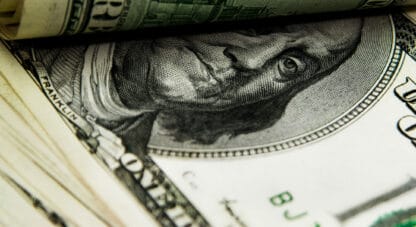Podcast: Play in new window
- We are living in the early stages of failed central planning
- Bear markets unfold when social mood turns decidedly negative
- Past episodes of currency destruction have been sponsored by academic elite
The McAlvany Weekly Commentary
with David McAlvany and Kevin Orrick
The Late, Not So Great, 1968… Is This A Repeat Only Louder?
June 3, 2020
Today we see an engineered asset price book, but the planners have forgotten that the benefits of the boom do not accrue equally. What are the social consequences? What are the political consequences of what was considered to be, but what is in fact not, successful planning? We are living out the early stages of a failed attempt at central planning. We have to plan, ourselves, and invest accordingly.
--David McAlvany
Now here are Kevin Orrick and David McAlvany:
Kevin: I was five years old and this was 1968, I remember as a five-year-old, you know, we only had access to the news once a day. You know, the evening news. Maybe they had it on twice. But I remember about dinnertime we had the black and white TV on. It could have been Walter Cronkite or one of the great newsman back in the 1960s, but I remember asking my mom, “Mom, what’s going on?” Every night they were talking about Martin Luther King’s assassination. Later, Bobby Kennedy’s assassination, the riots that were going on, the Vietnam War, and every night we would see those things, but something that’s different now, Dave, is, in 1968 we waited until six o’clock to hear one person tell us what was going on. At this point, everybody is seeing everything going on all at once, and they’re making their decisions on a moment-to-moment basis as to what side they’re on.
David: Well, you have social media, you have the ability to record everything. Who doesn’t have a smart phone with the camera? And so whether it’s Twitter, Instagram, Facebook, it’s all there on an instantaneous basis, which makes not only the news unending, it’s almost—you remember the Blair Witch Project and that sense of very low key, B film type horror movie…
Kevin: But you were continually lost in that film, that’s what the news has become. That’s exactly right. You know, you said something to me that it just keeps ringing. Bear markets unfold in periods where social mood has turned decidedly negative. In the 1960s, about that time we began one of the great bear markets of US history. The Dow went from 30 ounces of gold all the way down to one over the next decade.
David: It was amazing. Yeah. I mean, I think 28 was the peak in 1968, 28, down—pretty close to 30—28 down to one, but one! Amazing. And it has been fascinating to watch the news and to see the film clips of looting to see the posture that the police have taken subsequent to and after just the horrible things that occurred last week. But now there’s a lack of police interference in recent days, and frankly, it’s not a surprise to see SWBI, the old Smith & Wesson, up 50% in terms of value in less than a week.
Kevin: You know, you talked a couple of weeks ago about incentive alignment, how politics plays into this and how incentives play into this, and how social mood and actually social movements can be moved and maneuvered and actually utilized for benefit for politicians during a period of time where there’s this kind of destruction.
David: Yeah, incentive alignment is a critical thing and I’ve referenced that before, which is what made it fascinating to read lawyer Robert Barnes’ take on this where he says a key to riots is the deliberate change in the laws by cities and states. In the later 1960s, any city with a police used to be strictly liable for all property damage during a riot. They eliminated that in the late 1960s. Now cities are only liable if they intervene in a riot.
Kevin: So in other words, there’s no motivation to intervene in a riot because they’re liable if they do.
David: I thought that was fascinating. It certainly explains why shop owners have to conclude they are on their own. No one cares about their businesses like they do.
Kevin: You know, sometimes you’ll talk to an economist and they’ll talk about the benefits of war or the benefits of breaking things because you have to rebuild it and replace it with something new. In fact, I think about Nero back in the old Roman empire, okay, he burned Rome down, and he used it for his own political advantage. I mean, he blamed the Christians. So you blame a particular social group that you don’t like and you get a rebuild of Rome.
David: Right, well, in that case, you’re talking about an orchestrated event. Agents provocateur involved and what we have, what you suggested from an economic perspective, is the old broken window fallacy.
Kevin: Right.
David: So municipalities are going to have a lot to do in the years ahead, cleaning up, rebuilding after the riots. And you know so for your resident New York Times columnist Paul Krugman, the Nobel Prize winning, it just makes me laugh.
Kevin: He’s the guy who said that an alien invasion would actually help the economy.
David: (laughs) That’s right. He should be wildly enthusiastic about this. Because, you know, it didn’t take an alien invasion. It didn’t take a world war to start government spending. Just, it’s so funny to me that he suggested that both were great for improving aggregate demand.
Kevin: But an economist is going to say aggregate demand. Okay, what they do is they use terminology where it’s like, okay, we’re going to break this window so that we can create aggregate demand for another window.
David: Yeah, chips are down, unemployment is on the rise. Just order an alien invasion. That is, folks, a Nobel Prize-winning economist for you. So it’s wealth creating right. If you have lots of things to fix, no, not really. Because in part, not all economic activity is created equal. And so this is where the broken window fallacy comes in. That’s what Frederic Bastiat highlighted in 1850. The point is that broken windows require the allocation of scarce resources that might have gone someplace else, maybe even more beneficial. Maybe you could build a better community, which is, quite frankly, different than repairing a broken community. And so, yes, the person replacing the glass, you know, he’s only too happy to receive the glass. But could he have use that glass for schools, for art centers, for more? And, of course, the money spent for the broken window pane, as Bastiat writes about it, could have gone to the cobbler. It could have gone to some other businessman. So there is, in Krugman’s world, a winner for every loser. And you think about it, if the Men in Black were fighting aliens, it’s the men with PhDs that want to, for the sake of the greater good, actually invite them in, an improvement of wealth for all. And it’s just weird to me. Aliens and MMT [Modern Monetary Theory]. If you leave it to the professionals, everything is going to be just fine.
Kevin: What are the parallels, though. Okay, because 1968 was the late and not so great 1968. It was a very, very difficult time. And if you recall, that was a period of time where the dollar was moving towards its own destruction. It has lost 95% of its value since that. Well, really, a couple of years later, when we went off the gold standard. So the summer of 1968 everyone knows it was a historic landmark.
David: Well, I was always aware the summer ’68 from the vantage point of race riots here in the U.S. But also the May events in France, which at one point veered close to a Marxist overthrow of the de Gaulle government. And it was not a traditional Marxist Leninist-inspired movement, but one that sort of channeled the student population’s energy. In Paris, the student population had grown, I think, from 175,000 to over 500,000 students, a growth in that population but with a vision of retribution and revolution, kind of more in the fashion of Che Quevara or Mao Zedong or Ho Chi Minh. And you know, now we have the advantage of history. History has given us a little perspective on the consequences of the ideas which were driving those 1968 events in Europe.
Kevin: While how many lives were lost during that period of time or because of communism?
David: The global body count was in the tens of millions, and I guess that’s just with Mao. But to this day, you can see T-shirts of Che Guevara, he is probably more of a pop icon now more than a revolutionary. But you see those down on college campuses across the country as kind of an expression of you know, system revolt or I’m going to do my own thing.
Kevin: Well, isn’t the battle cry justice, Isn’t it always justice? Give us justice for what’s going on?
David: Absolutely. And in every period of time you look at the definition of justice and it tends to shift just a little bit. So Kevin, you and I have talked about the great ideas and that series of books, which was put together by Mortimer Adler, and, in the beginning, is a series of essays: 102 essays which deal with the recurrent themes throughout world history—and justice is one of them. And you can see how different people have had different opinions on it and how the dialogue, the dialogue on that idea, has been added to and changed and been improved in some respects through time. So, at the time—we’re talking about Paris 1968—it was academics in Paris universities who were lined up in support of those three figures, whether it’s Che or Mao or Ho Chi Minh. Very, very popular in Paris.
Kevin: Well, and today the excuse is the George Floyd riots, right? I mean, there’s always a movement underneath the movement underneath the movement. And we saw that in Paris.
David: Yeah, and they had their own version of justice and how that was defined in the ’60s. ’68 took the prize for the craziest year. May of ’68 got things really rocking, and it was a crazy year. Today’s George Floyd riots are being compared to 1968 and to be fair, to be crystal clear, the protests over his death have become something very different. And so Antifa, a modern movement inspired by the writings of Mark Bray, have taken the opportunity of large crowds and have harnessed the energy of the crowds towards their own ends, specifically to rage against the machine, so to say, where anarchy meets socialist Communist utopia ideals, utopian ideals. And this is where you find an angry mix of hooligans interspersed with legitimate protest over the death of George Floyd.
Kevin: Well, we saw the same thing in 1968 then. We’re talking about Martin Luther King. There were an awful lot of elements around the protests that had nothing to do with Martin Luther King.
David: Yeah, there are similarities to ’68, obviously the death of Martin Luther King. He was killed in April of ’68. Particularly in terms of there being just a general boiling point reached where racial concerns, obviously tied to police violence and endemic injustice and perhaps not coincidental, today you’ve got the far left co-opting grief and rage over the George Floyd event to stir and really tear down the system. You’ve got a cocktail of violence. You look at looting, which goes well beyond protest, well beyond someone saying this is a problem, and you have to deal with the police who are directly involved in this, which has been done.
Kevin: Isn’t it strange, too, where you have a convergence of all these things at once? I mean, one aspect of the Paris/D.C. 1968 period was that there was fragility in the financial markets.
David: I think that was a big deal. One aspect of, if you’re looking at both Washington D. C., what we were dealing with here in the United States, and Paris was, it was not just the financial markets, as in stocks and bonds, but also currencies. In addition, you had the war protests as a backdrop. There was the Kent State shooting of students. There was a sense of anger over both the draft and the civil rights issues of the day. However, from an economic perspective, I think one of the key aspects was deterioration and dollar stability, and it was a key feature in the tie between France and the United States. You had Johnson’s guns and butter policies, which set the stage for US dollar devaluation, much the way we are today, frankly, going through trillions of dollars with fiscal promises and monetary printing schemes. But shortly to follow this Johnson devaluation, the guns and butter promises, was the suspension of the Bretton Woods monetary agreement, which had been in place since 1944.
Kevin: And there were people who saw what was coming. The dollar devaluation was denied. I mean, there were just a ton of deniers saying, well, that will never, ever happen. The dollar will continue to stay on the gold standard. In fact, I think Nixon said the same thing till he said the opposite. But Charles de Gaulle, started, ’68, ’69, started changing his dollars into gold. He saw something coming. We’re seeing that now, Dave. The demand for gold. For those who are seeing what’s coming, there are these similarities. I don’t want to say that history repeats exactly. But, man, is it rhyming.
David: (laughs) Denial. You know, it’s the river that runs from Washington, D.C. to Wall Street. No, the French were no fools. The French began taking U.S. gold rather than greenbacks, knowing that one of them, obviously gold, was a far better store of value. And I love the story of Jacques Rueff. He was a young man appointed to being the financial attaché in Great Britain during the sterling devaluation. So he watches this happen to the British, and…
Kevin: That was in the 1930s…
David: That’s right. Now, fast forward to the 1960s, and he’s trying to get De Gaulle’s attention. De Gaulle ignores and just sort of stonewalls. And so he actually starts printing articles in Le Monde until De Gualle grants him a meeting. And, yeah, it’s interesting to me because you know, the French, again, they’re not unfamiliar with this. Not only did Jacques Rueff bring to life for De Gualle what was happening in the thirties, he said, look, the U.S. is about to devalue again, but there’s sort of built into the French psyche the problem of devaluation…1789, we know that is the French Revolution, right, and the complete destruction of the French currency, which happened at the same time. And there is no coincidence there when you look at the nature of revolution, what it does to a business environment, what it does to an economy, and what it forces leadership to do in order to try to smooth things over, and, frankly, buy things down off of the boil, if you will. And so it’s not the first time. It’s not the last time the French would directly experience a currency meltdown, which is to say they had enough awareness of the contributing factors for currency devaluation to do what was in their best interest, and remove as much gold as they could from Fort Knox as possible.
Kevin: Yeah, and by August of 1971, right before Nixon did close the gold window, I had read that there were 15 tons an hour coming out of Fort Knox and going over to Europe. So obviously somebody saw that the gold window was going to be closed.
David: Well, in ’68 the US was threatening the French, telling them that “Friends of America” would take green and not gold. You would take dollars instead of gold ounces, and they understood. The French understood. And the pace of gold, as you said, it quickly increased. So what are you dealing with? You’re dealing with a period of distrust. It was a period of heightened geopolitical tensions, and I think this is really the critical piece, because negative social mood percolated up and turned politically violent, and it did so at the end of a bull market inequity.
Kevin: And that bull market inequity actually started in the late ’40s after World War Two, and that went up to what, the late ’60s?
David: Right, but one of the things happening as you get to the end of bull market in equities is you reveal this huge gap between rich and poor. You’ve got asset prices that have done very well. Now all of a sudden they’re moving into retreat in ’68. And what that did is it underscored, it actually reinforced a period of negativity and protest and political upheaval and uncertainty in terms of liabilities, assets, unfunded liabilities, etcetera, etcetera.
Kevin: That opened up a door for Nixon, didn’t it?
David: Nixon rode in on a white horse. And he brought a very matter of fact style of conservative Republican management. So he takes office in ’69 you. When he takes office, Nixon decided he needed more monetary firepower to handle the raucous environment he was elected into. And so he moves out William McChesney Martin in favor of a pushover. Then he puts Arthur Burns into the number one seat at the Federal Reserve, and then the inflation could begin in earnest. So to say that the context was set, both then and now, for an eruption of protest or even violence, I think that’s easy. My comments on the issues from last week point to the underlying economic issues in play, not to civil rights, not to social justice issues. These are not my areas of expertise, and you’ll find a billion opinions on that and even a few that are cogent and insightful. Just one or two. (laughs). But better than mine, for sure. And I think bear markets, this is my key point is that bear markets unfold in periods were social mood has turned decidedly negative.
Kevin: That’s something to just continue to repeat. Okay, bear markets, unfold in periods where social mood has turned decidedly negative. You have ask yourself the question…
David: That’s your take-away. If we didn’t have a variety of concerns and play already, we have the Chinese-U.S. relations. We have years of deteriorating global economic fundamentals. We now have a depression triggered by COVID-19. So you may say George Floyd has nothing to do with the markets. On the one hand, you’re right, but all conflict has a backstory, and there are underlying tensions, which are released at a particular point in time. Political chaos, a divisive electorate, depth of concern over the heart and soul of the country. Those were characteristics in 1968…
Kevin: And today. What you’re seeing is the parallel.
David: And today! So that the bottom line is that social mood had soured to the point where a bull market that began in 1949, if you set aside the six months in ’61 tied to the Bay of Pigs, you basically had a great run from ’49 to 1968 and it could not continue any further. The attempts at preventing it, largely monetary in nature, they ended up, in the final analysis, exaggerating financial losses by layering on that sort of toxic icing of inflation on the already rotten economic cake.
Kevin: You know, you talk about the toxic icing of inflation… this weekend I just wanted to go back and listen to Otmar Issing’s interview from 10 years ago…
David: (laughs) It’s Issing, not icing.
Kevin: No, no, no. I said Issing. Otmar Issing. And, you know, for the listener who maybe has joined us in the last ten years and actually hasn’t heard that, you can go back and listen in the archives. But Otmar Issing was sort of the grandfather or father of the euro. Okay, and he was the head of the European Central Bank, of course, for the first seven years. What was interesting to listen to him talking about, though, was inflation. Because in the German psyche—you had talked about the French destroying their currency multiple times—the Germans did, too. And when I’ve met Germans who’ve been through that… Klaus Buescher, he was a money manager that I knew, Otmar Issing… that sears a wound on someone that, honestly, they never get over. And Ottmar Issing was concerned ten years ago about the intervention of the central banks and how they were going to back away and how they were going to control inflation. Now, we haven’t had that yet. We haven’t had that increase in velocity, but we’ve had trillions and trillions and trillions of new money put into the system. And I think it’s important for us to see, you know, you’re talking about these bull markets. In 1966, gold was worth 1/28 of the Dow. Okay, By 1979, gold was worth the whole Dow. So when we talk about inflation, when we talk about these turning points, you talked about bear markets really coming in when there’s political tension or social tension…
David: Well, right, so I mean, where does the bear market begin? In 1968, it began in the context of assassinations and riots, and I would argue that it didn’t end. The secular bear didn’t end until 1982. There were cyclical gyrations in between, of course, but coming into that period, stocks were extended. 1949 to 1968 was one hell of a bull market. And yeah, it caught a lot of pent up demand from World War Two. And then you also had the normalization of the capital markets after being largely command-and-control in their dynamics during the war. But then, all of a sudden, there is specter, specter on the horizon. Inflation was a specter of concern, and it turned out to become a major factor in negative returns during the ’70s. Ten year treasury, in real terms if you’re factoring in inflation, had hung around 2% throughout the 1960s and then…
Kevin: Sounds familiar, doesn’t it?
David: …it began to dive towards negative. So you’ve got negative yields in real or inflation adjusted terms, negative yield territory in the waning years of the decade, and they would stay negative through about 1974, 1975.
Kevin: Ok, but what’s the difference now? Okay, with central banks, we’ve outlined this. The ten years since you interviewed Otmar Issing, we’ve seen the muscle of the central banks increase. They’re the Arnold Schwarzeneggers right now of the world.
David: Yeah, there’s a huge difference between then and now, although social mood is souring fast. And central bank muscle was very underdeveloped in 1968. The heavy lifting we see today would never have been considered then, in part because Martin knew the long-term consequences of playing God with system.
Kevin: You’re talking about William McChesney Martin, the Federal Reserve chairman.
David: Yeah, and so he thought it was better to stay sane and sober, and, in his words, remove the punch bowl before the party even got started.
Kevin: Okay, but was there monetization back then? I mean, we know that there was some degree of monetization, but nothing like we see now…
David: Sure, but again, it really got started with Burns. He was the pushover. He was the Nixon puppet, if you will, and creating a lot of the inflation. Of course, you could say the stage was set by the guns and butter policies. All he did was sort of, you know, open the cork, so to say, or take the cork out.
Was there debt monetization then and now? Of course. But balance sheet expansions, like we’ve seen both in the 2008 in 2009 period. And of course, now again, in the current context, this is different, and it creates a really incendiary situation. If you step back from the George Floyd concerns for a moment and count what we have today, 14 or 15% unemployment figures and we’re on the way to 15 to 20%. What we’re talking about is a huge swath of the population, insecure people in an awkward state of limbo. As long as the benefits flow, they’re fine. Anxiety is kept at a low ebb. But when the benefits end, which for most people is tail-end of 2020 and early 2021, now you have real social anxiety. You’re talking about 40 to 65 million unemployed people. Social mood will dictate the course of the equity markets, and I think that’s going to be lower, not just over a one-month period of time or two-week period of time like we may have seen in March, but for the next 2 to 3 years, in a cycle very similar to the early 1970s. But we will be falling, I think, from a much higher perch with even graver consequences.
Kevin: You know, during the Occupy Wall Street movement, there was a feeling that something was terribly wrong. But people really didn’t know what it was. I went down there. My daughter lived in New York at the time, so I went down to the Occupy Wall Street movement there near Wall Street. And I just spent a little bit of time talking to people. I walked through the whole area, that park area, that they had all camped. And, you know, one guy had a Constitution of the United States in one pocket, and he had Marx, Karl Marx in the other pocket, and he didn’t see the difference between the two. They knew there needed to be a change, but they were nonviolent, Dave. The Occupy Wall Street was misguided, but really there was no violence. At this point, we’re seeing violence.
David: Yeah, in that same context, do a side-by-side comparison of asset bubbles still being blown to larger proportions by the Fed. And what you have is really not the rebirth of the Occupy Wall Street. It’s the new birth of a destroy Wall Street altogether movement. And I don’t think it’s lost on the Antifa organizers who are primarily anti-capitalist and have no problem burning everything they possibly can. And, yeah, they are anti-cop, but I would encourage you, if you’re curious about this, if you think now this is bs… Where is he getting this? Read Mark Bray. Do your own homework, read Mark Bray. You’ll find the heart of the anti-fascist movement has its roots in the radical left prewar workers movements, it’s a blend of Trotsky and Lenin. And I’d say more Trotsky. There is that divide between the Menshevik and the Bolsheviks and the Menshevik expression was a lot less centralized and a lot more anarchistic, and it has a lot more of the feel of Antifa crowd.
Kevin: Isn’t it strange, though, that the Dow just rises and acts like nothing’s going on? So if you are actually just monitoring charts. Let’s say you had no access to the news, and all you could see was the Dow Jones industrial average, granted, it came down pretty hard back in March, but it’s not paying any attention to what’s going on over this last week or two.
David: No, when you when you think about the social discontent, when you think about the Occupy Wall Street movement, we think about how, in spite of the newsreels filled with all sorts of chaos last week, the market is completely ignored it and it’s moved aggressively higher. Two words: Fed liquidity. Right, central bank intervention. That’s a massive issue, and it’s a massive issue going forward, I think, a dangerous issue for two reasons. One, it adds to the late cycle bubble dynamics, which make a bust even more dangerous. Remember, I said, you know you’re playing at these heights and you fall the consequences are more grave. The second issue with Fed liquidity is that the central bank is setting up the collective psyche to get smashed even harder when they see their last and best hope of economic recovery being discredited.
Kevin: Doesn’t that happen, though, when you have an artificial security? You know, we talked a few weeks ago about the artificial means of security are being shaken away right now. The Fed’s artificial means of security, however, has not been shaken away.
David: Yeah, and I think bubbles are particularly dangerous because the social and political aftermath they unleash is really where you’re talking about the human side. The human side of economics and finance, which can get pretty ugly. And of grave concern is what happens to social mood, which is already negative. When it’s obvious that the Fed is trapped, when it becomes obvious to everybody that the reflation of assets has been overdone, and, in fact, the Fed is taking us over a monetary cliff…
Kevin: Yeah, listening again to Otmar Issing, a German who really feared inflation. He did not want to see inflation come in. It reminds me of Adam Ferguson’s book When money Dies, we all read that as an office. A while back we had Adam Ferguson on as a guest, but really the horrific conditions of hyperinflation nobody ever wants to repeat. It’s almost like going through a nuclear winter. It’s like, never again.
David: If you haven’t read Adam Ferguson’s book When Money Dies, you simply must. And of course, you can go to the archives and listen to our interview with him, but you’ve got past episodes of currency destruction and the interesting thing is they’ve always been sponsored. They’ve always been sponsored by the academic elite. They made sense at the time. There was a logic to them that was inescapable. And you’ll see that when any central banker is trapped, being trapped defines a logical, albeit dangerous, and ultimately deadly course. And I think it’s deadly for the currency, of course. And then you have many people who are trapped with the currency, and it can become deadly for them as well. But you get that human story in the context of his book, When Money Dies.
Kevin: Well, we’ve been talking about the difference between 1968 and now. The difference is the world really, at this point, is in the cradled arms of the central banks.
David: Yeah, I think that’s a huge thing. Since ’68 there’s been abroad adoption by the Global Central Bank community of radical interventionist measures, and in this episode you’ve had great wealth that’s been created. Much of it is concentrated…
Kevin: Right at the top.
David: …which creates a very dangerous environment. Because in reaction to that, when you start seeing unemployment numbers like we have, and any reason for discontent like we have, now all of a sudden a conversation about redistribution, about fairness, about retribution, about reparation, about social justice…
Kevin: Well, social justice … it almost sounds like the late 1700s in France.
David: I mean, you could say 1905 in Russia, you could say 1789 in France. I mean, there’s a lot of episodes where, when the masses get something in their minds—again, redistribution, fairness, retribution, reparations, social justice—you can get ready for a wild political ride because now you’ve got the global under or unemployed looking to balance the scales and move wealth from the few to the many. And again, in that sense, yeah, 1789 is not that far-fetched. If violence gets bad enough, then you have politicians who are only too pleased to ride the wave of popular discontent, to lock in their power franchises, and to use the electorate to their advantage and, in the process, basically use the currency as fodder.
Kevin: I think we could look at each one of those occasions of revolution as also a currency destruction. Well, with that said, we’ve all heard this new phrase “flattening the curve.” And last week we talked on the commentary how it’s impossible right now to determine risk in things because, you know, you have absolute certainty built into the market. They flatten the curve. But actually we’re in a period of great uncertainty.
David: What I loved in this last week’s review of some McKinsey research, one of them titled Crushing Coronavirus Uncertainty: The Big ‘Unlock’ for Our Economies. You know, you think of flattening the curve. And really, what you’re talking about is orchestrating a social change, and you orchestrate social change by getting in people’s heads. In this case, whether it is dealing with current unrest in the streets, or, in the case of COVID-19, which still hasn’t gone away, the objective, this is to quote directly from McKinsey, “the objective now must be to crush uncertainty as soon as possible. As we’ve seen in previous crises, when uncertainty subsides, confidence returns, economic recovery unlocks. And the COVID-19 crisis has created the highest level of uncertainty in 35 years.” Well, now, Kevin, add to that COVID crisis high level of uncertainty, what you have with a society which seems to be torn asunder, with differences of political opinions, with conflict about what justice is. And now you have what we have had for a long time, the problem of planning.
Kevin: And the planning, that’s the difference between 1968 and now. Because at this point, we have, as a world, adopted this idea that you plan from the top. You plan from the top and it’s going to be better than letting it work itself out from the bottom.
David: Frederick Hayek posed the challenge that it’s not the possibility of planning as such, which has to be questioned, but the possibility of successful planning. And today we see an engineered asset price book. We have that, compliments of the central bank balance sheet largesse. But the planners have forgotten that the benefits of the boom do not accrue equally, and that presents significant political ramifications in the future. I think that’s what we’re beginning to unwind and see happen is what are the social consequences? What are the political consequences of what was considered to be, but what is in fact not, successful planning? We are living out the early stages of a failed attempt at central planning. We have to plan ourselves and invest accordingly.
















